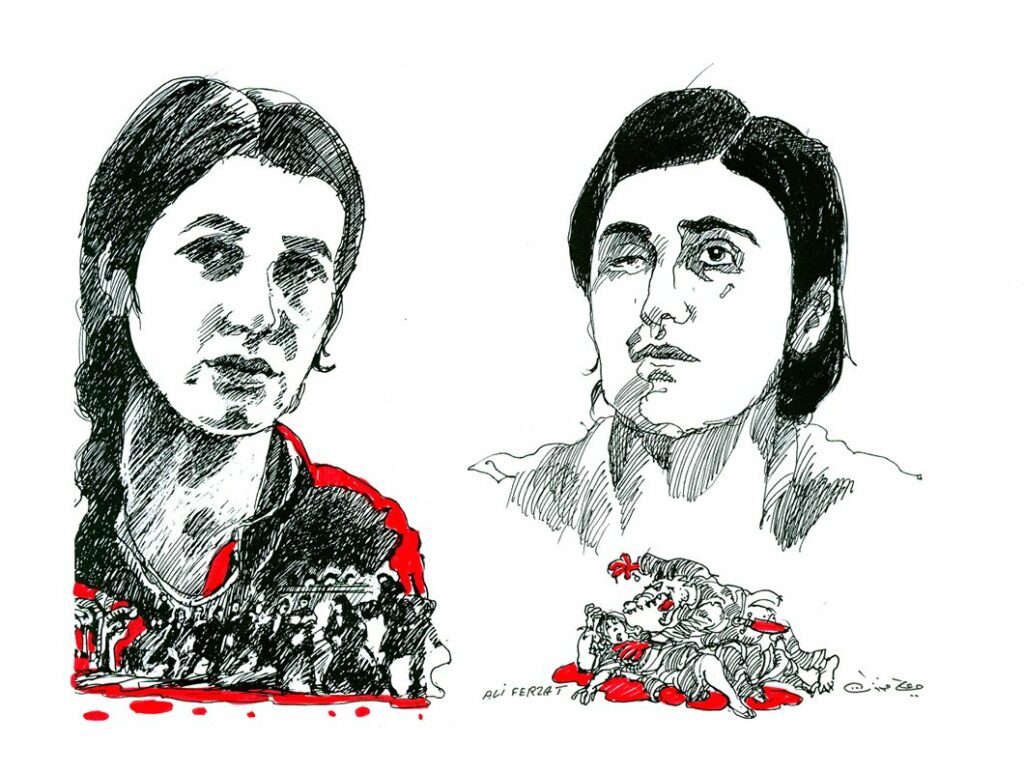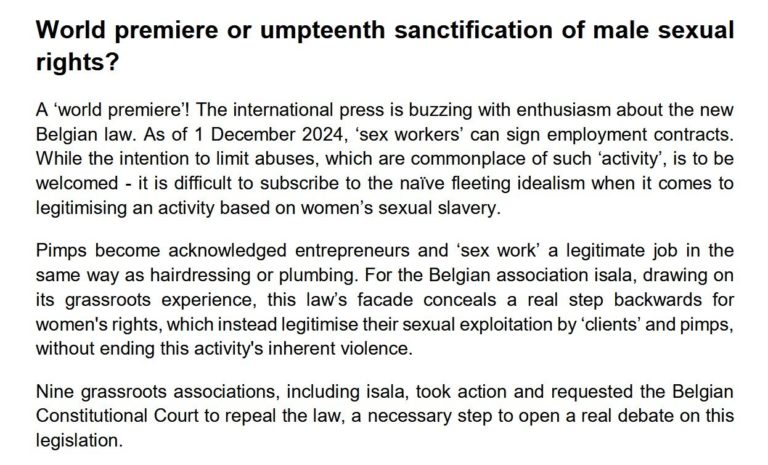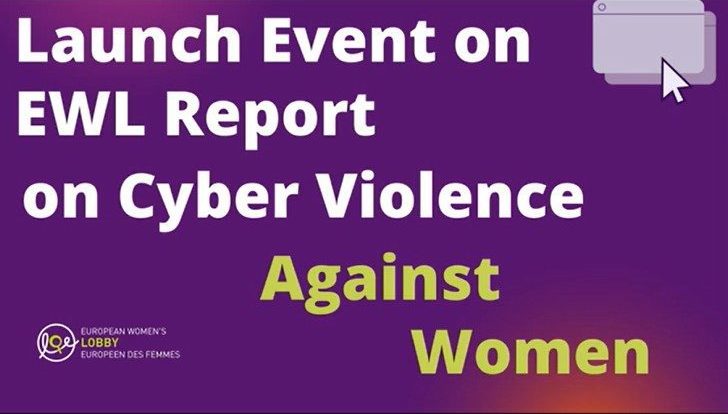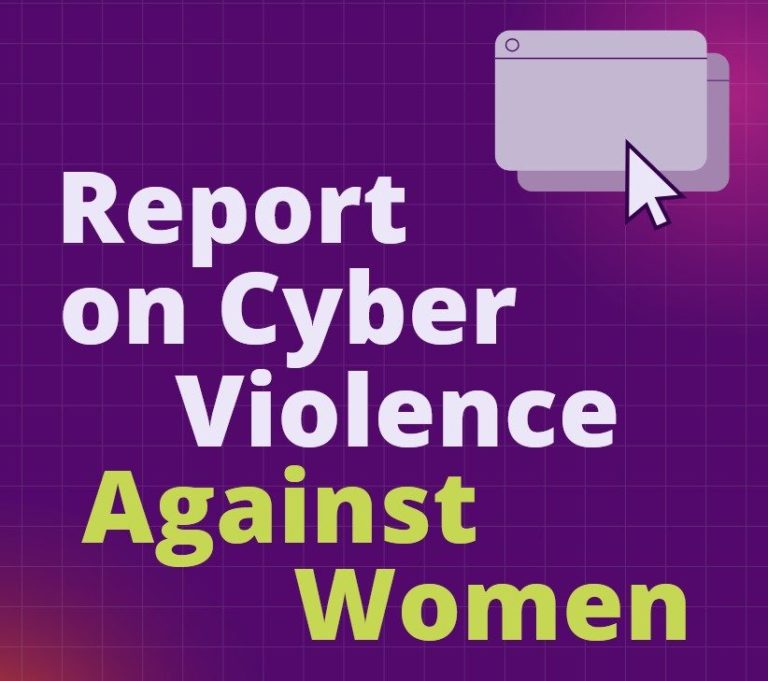[Brussels, 7 November 2016] After the summer break, October brought the voices of refugee women and girls back on the political agenda. The European Women’s Lobby (EWL) project From conflict to peace? continues to be visible thanks to the commitment and action of EWL members across Europe. We expect that EU and national decision-makers will hear refugee #womensvoices and take action to end the violations of their human rights throughout Europe and beyond.
On 14 October, the Portuguese Platform for Women’s Rights partnered with several structures to organise an international conference “Refugee women: roaming between multiple discriminations->http://plataformamulheres.org.pt/evento/conferencia-internacional-mulheres-refugiadas-em-transito-entre-discriminacoes-multiplas/]”. Thanks to the support of the Friedrich Ebert Foundation, EWL Policy and Campaigns Director Pierrette Pape joined the event to present EWL #womensvoices project and highlight the widespread violence that women and girls face at all stages of their journey (download her presentation [here). A series of speakers from various countries shared their analysis and reality: the situation in refugee camps in Greece, the experiences and action of refugee women in Germany (like the activities organized by artist Bibiana Lopena Pineda, from Colectivo Creando Memoria in Berlin), the concrete answers in Hamburg, Germany and Portugal.
Two Members of the European Parliament (EP) were also invited to present their work and their views: MEP Mary Honeyball (UK, S&D), rapporteur of the EP resolution on refugee women, and MEP Ana Gomes (Portugal, S&D) who talked about Europe’s violating the human rights of refugees. You can read a press report of the conference here (in Portuguese) with some quotes from EWL.
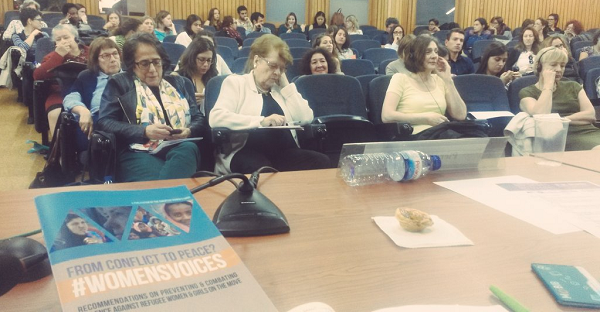
On 18 October, Vienna’s Programme for Women’s Health organised an event on “Asylum from the women’s perspective: does health stay on track?”. After a keynote speech from researcher Jane Freedman on the gendered experiences and needs of women refugees in Europe, Austrian professionals shared their views on the health consequences for women and girls refugees. They stated that access to health is a matter of justice and human rights, that women experience trauma also from the journey itself, and that sexual violence has detrimental life-long impact on them.
The EWL was invited to present its #womensvoices project in a workshop on violence against refugee women (download her presentation here), together with a representative from UNHCR who highlighted the pervasive impunity and the culture of misbelief when it comes to women’s esperience of male violence. As expressed by a frontline Austrian NGO, we must not leave the gender perspective to chance, it has to be systematic and based on political will.
On 24 October, the EWL organised the international conference “Movements, Borders, Rights? Feminist perspectives on global issues in Europe” in Brussels, together with WIDE+. As part of the very important discussions being held during the conference, one plenary panel was dedicated to refugee and migrant women. Pierrette Pape presented again EWL #womensvoices project and the reality of violence faced by women and girls: despite fleeing conflict and violence, women and girls end up experimenting more violence and discrimination on their journey. Can we talk about peace for women and girls in Europe? In her video message, Marcy Hersh, from the Women’s Refugee Commission, shared her assessment of the reality on the ground: there is no consideration of women’s protection needs and a systematic absence of protection systems, which leads to widespread acts of male violence on the move and at destination.

Inspiring speakers shared their perspectives. Journalist Marianna Karakoulaki informed the audience of the reality in Greece right now, and described why the refugee situation is a feminist issue: because women face violence, have to sell their body to get protection, have no health support and no information about their rights. Refugees are seen today as numbers, not as people. Ola Aljari, a journalist and refugee herself, testified about the lack of protection in the camps, and how the bureaucratic asylum/migration procedures put women at risk. Hibaaq Osman, from El-Karama, called on European people to react and feel accountable for the worldwide situation which is affecting primarily women and girls. Positive stories included self-organised camps, a self-organised radio, and international solidarity in the feminist movement.
A follow-up workshop took place on asylum and women’s rights, where participants called for the EU ratification of the Istanbul Convention without reservations, for individualised rights for women and reporting systems to ensure access to justice, for codes of conduct for all staff and volunteers involved in asylum and migration action, for an end to the militarisation and privatisation of security in the camps/centres, for integration policies as refugees will stay in Europe. We highlighted the need to name what is happening, name perpetrators and the trauma related to asylum and to violence against women, and develop proactive and positive actions beyond the global male rhetoric that ‘the world is dangerous’.
On 27 October, EWL members LEF Italia and BPW Italy organised a roundtable on “Women’s voices: from conflict to peace”. Two members of the Parliamentary Assembly of the Council of Europe, Elena Centemero and Michele Nicoletti, referred to the Istanbul Convention as an important tool to prevent male violence against refugee women and girls. Women’s organisations recalled participants that migration is part of our societies, is also our future, and therefore needs positive policies.
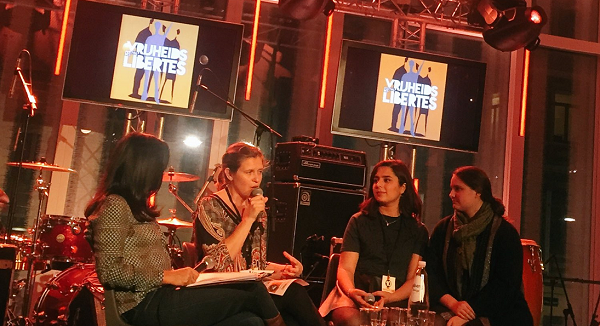
Finally, on 29 October, the EWL was a partner of the screening of the documentary “Sonita” during the Festival des Libertés in Brussels. The documentary follows Sonita, a young Afghan woman living in Iran, who is trapped into a forced marriage and tries to escape in order to realise her dream, being a singer. Together with Mina Jaf, Pierrette Pape joined the discussion after the screening, addressing the systemic violence faced by women and girls and the need for concrete political answers. Mina shared her experience as a refugee, and as a volunteer in refugee camps; she created a new organisation called Women Refugee Route; find out more about her here. “Sonita” won the prize of the FIDH – International Federation for Human Rights :)
All these events came at the same time as Nadia Murad Base and Lamiya Aji Bachar, both Yezidi survivors, were awarded the European Parliament Sakharov Prize for Freedom of Thought, for their courage and action to raise awareness on the sexual exploitation of women and girls in conflict zones. A very important recognition of the positive role of women and the detrimental impact of the very masculine prominent vision of power…


